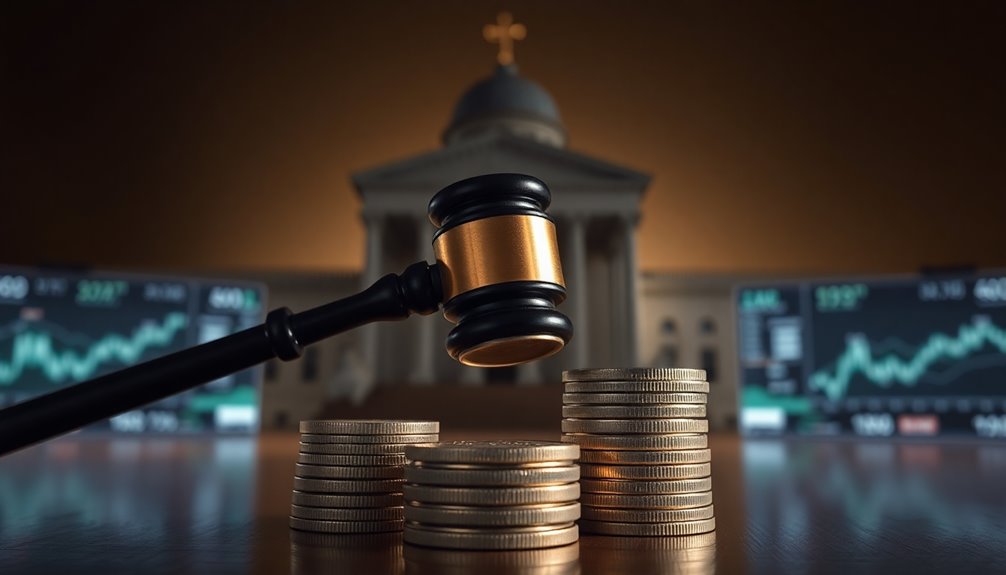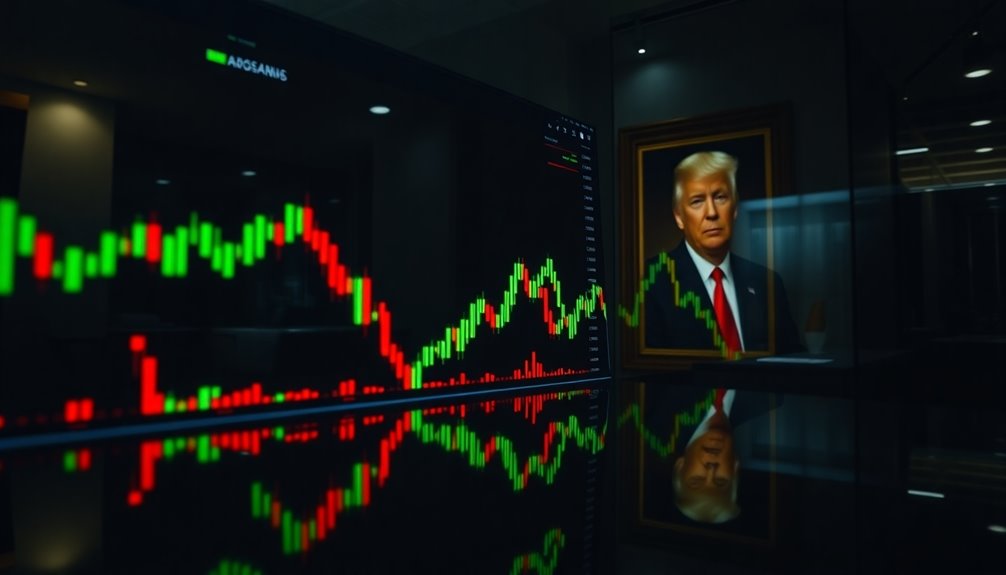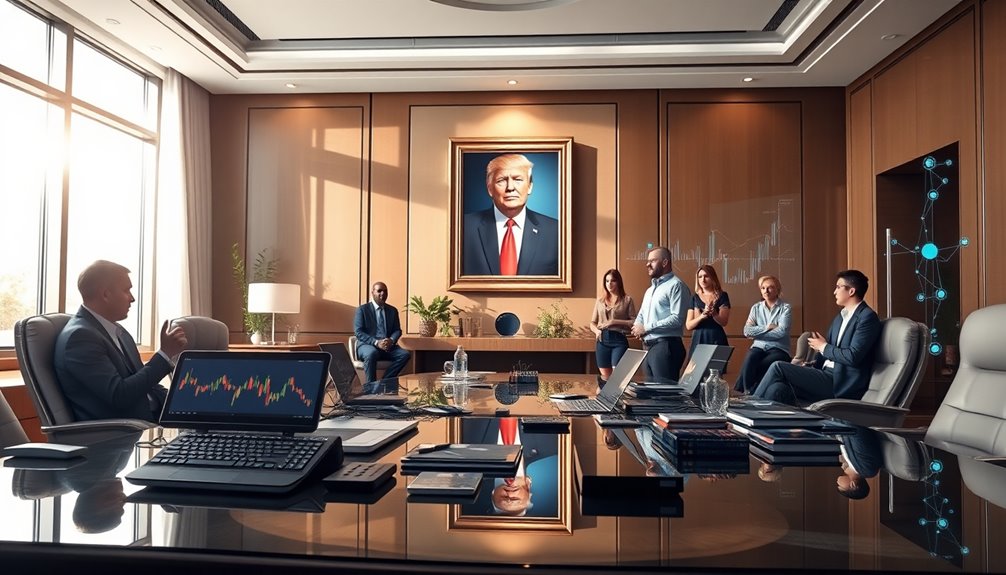Donald Trump's first day in office could see him issue executive orders that reshape the U.S. cryptocurrency landscape. You might find that these orders are aimed at promoting blockchain growth and addressing de-banking issues. Trump's approach might also align with influential figures who support integrating AI with crypto initiatives. Plus, changes in regulatory frameworks could impact how financial regulators oversee digital currencies. This move may lead to significant shifts in market dynamics and even boost corporate blockchain adoption. Stick around if you want to uncover how these actions could influence both the crypto market and regulatory environment.
Key Takeaways
- Trump may focus on advancing blockchain technology and supporting digital assets on his first day in office.
- Executive orders could aim to address de-banking issues affecting the crypto industry.
- Integration of artificial intelligence with crypto initiatives could be prioritized in his administration.
- Regulatory frameworks surrounding digital currencies may be reevaluated to enhance oversight and stability.
- Key figures in the crypto sector may influence the formulation of these executive orders.
Crypto Policies on Day One

On Day One of Donald Trump's administration, you can expect a strong focus on crypto policies aimed at supporting digital assets and advancing blockchain technology. His executive orders will promote the growth of blockchain in the U.S. and integrate artificial intelligence with crypto initiatives. This marks a significant regulatory shift from the previous administration, creating a more business-friendly environment. Key figures like Marc Andreessen and David Sacks will actively shape these policies, ensuring tech and defense sectors align with new strategies. Expect efforts to address de-banking issues and revise crypto accounting standards, allowing financial institutions to hold digital assets on behalf of clients. Additionally, the administration will prioritize tackling de-banking challenges faced by crypto firms to foster a supportive ecosystem.
Legal Implications of Crypto Orders

As the Trump administration implements its crypto executive orders, the legal implications will play a crucial role in shaping the regulatory landscape.
The President's inherent authority in national security allows for significant actions against cryptocurrencies, justifying them under statutes like the Patriot Act and the International Economic Emergency Powers Act. Additionally, evaluating these orders against Constitutional provisions is vital, as some presidents have interpreted their powers broadly. Financial regulators, including the SEC and CFTC, must also align their oversight with these new directives, addressing investor protection and regulatory gaps. Furthermore, the orders could impact the development of CBDCs, as they may prompt a reevaluation of the regulatory framework surrounding digital currencies.
Crypto Price Volatility Analysis

Understanding crypto price volatility is essential for navigating the unpredictable landscape of digital currencies. Market sentiment plays a crucial role, as positive news can spark rapid price increases, while negative news can trigger swift declines. Emotional trading often exacerbates these fluctuations, driven by fear or greed. Additionally, supply and demand dynamics significantly impact prices; limited supply, like Bitcoin's cap, can lead to price surges when demand spikes. Conversely, oversupply can push prices down.
Security issues, such as exchange hacks, erode investor confidence and create panic, resulting in sharp declines. Regulatory changes can also introduce sudden shifts, influencing both sentiment and market stability. Institutional investments can introduce significant capital inflows or outflows, further impacting market dynamics.
Staying informed about these factors will help you make better investment decisions.
Corporate Blockchain Integration Trends

While many businesses explore innovative technologies, corporate blockchain integration is rapidly gaining traction across various industries.
You'll notice an increased adoption of decentralized security, which enhances transparency and protects against cyber threats. Smart contracts are automating transactions, boosting efficiency in operations.
However, scalability challenges persist, prompting companies to seek solutions for better performance. The evolving regulatory environment also plays a crucial role, as new frameworks emerge to support blockchain integration. With the blockchain services market projected to grow from $3.28 billion in 2022 to 19.76 billion by 2027(19.76 billion by 2027), demand for skilled developers is surging, too, as organizations race to implement secure applications.
Industries like supply chain and finance are already benefiting from blockchain's capabilities, improving transparency and accountability.
As these trends continue, you'll see a more widespread embrace of blockchain across various sectors.
Election Campaigns and Crypto Policies

The rise of blockchain technology isn't just reshaping industries; it's also making waves in the political arena, especially in election campaigns. Since 2014, the Federal Election Commission (FEC) has allowed cryptocurrency donations, treating them as "in-kind contributions." You can contribute Bitcoin or other cryptocurrencies to political committees, with the value based on market rates at the time of donation. Some states like Arizona and Colorado embrace this trend, while others, like Michigan and North Carolina, have outright bans. Individual federal candidates can accept cryptocurrency, but they cannot use it for campaign expenditures. The influence of crypto on campaign finance is growing, with pro-crypto super PACs pouring in significant funds, signaling a shift towards a more crypto-friendly political climate. Furthermore, the decentralized nature of blockchain enhances transparency, which is crucial for maintaining trust in political donations. However, transparency and security remain major concerns that candidates must address.
Regulatory Landscape Evolution

As the cryptocurrency market continues to expand, regulatory bodies are ramping up their scrutiny to address the challenges posed by digital assets. You'll notice increasing regulatory activity, driven by greater usage among investors, companies, and central banks. Key issues like licensing, fraud risks, and consumer protections are at the forefront. The stablecoin market alone has skyrocketed to nearly $130 billion, highlighting the need for clear regulations. In the U.S., multiple regulators share jurisdiction, complicating compliance for firms. Furthermore, the rapid evolution of crypto and digital assets creates compliance difficulties for regulatory bodies. Internationally, organizations like the Financial Stability Board and the World Economic Forum are pushing for global rules. As legislation evolves, expect a focus on defining digital assets, enhancing market integrity, and safeguarding investors across various jurisdictions.
Frequently Asked Questions
What Cryptocurrencies Might Be Prioritized in Trump's Executive Orders?
In any potential executive orders, you might see Bitcoin prioritized due to its established status.
Ethereum could also be a focus, given its robust smart contract capabilities.
Other cryptocurrencies like stablecoins may gain attention for their potential in facilitating transactions and promoting financial stability.
Additionally, you might notice support for emerging projects that enhance blockchain technology and foster financial inclusion, as these align with broader economic goals.
How Could Crypto Executive Orders Impact Everyday Users?
Imagine a garden where regulations act like sunlight, nourishing your crypto plants to flourish.
Crypto executive orders can bring clarity, reducing the shadows of uncertainty that often cloud your investment decisions. With clear regulatory frameworks in place, investors can make more informed choices, potentially leading to greater confidence in the cryptocurrency market. Furthermore, understanding various trading strategies, such as stop orders explained, can help investors mitigate risks and protect their capital. By equipping themselves with the right knowledge and insights, they can navigate the complexities of crypto investments with greater ease and assurance.
You'll feel safer knowing there're protections against fraud and market manipulation.
With clearer rules, you can navigate this landscape more confidently, opening doors to new opportunities and partnerships, ensuring your digital assets blossom in a stable, supportive environment.
Will Trump's Orders Affect Existing Cryptocurrency Regulations?
Yes, Trump's orders could significantly affect existing cryptocurrency regulations.
If he repeals guidelines like SAB 121, you'll see banks more easily holding crypto assets without counting them as liabilities. This change could reduce de-banking issues, allowing crypto companies to access traditional banking services more freely.
What Are Potential International Reactions to Trump's Crypto Policies?
As the winds of change blow through the crypto landscape, you might witness a surge of international reactions to Trump's policies.
Countries could scramble to adjust their regulatory frameworks, seeking to either emulate or counter the U.S. approach. Investors may flock to U.S. markets, boosting confidence, but volatility could loom.
Additionally, nations might collaborate on global standards, while others might compete fiercely, reshaping the dynamics of the cryptocurrency world.
How Might Trump's Policies Influence Crypto Mining Operations?
Trump's policies could significantly influence crypto mining operations by promoting domestic initiatives and reducing regulatory burdens.
You might see increased support for sustainable energy solutions, making mining more environmentally friendly.
Additionally, with potential infrastructure investments, mining operations could become more efficient and economically viable.
These changes could create job opportunities and stimulate technological advancements, positioning the U.S. as a leader in the crypto mining industry while fostering innovation and growth in the sector.
Conclusion
On day one, if Donald Trump issues crypto executive orders, it could shake up the entire financial landscape faster than you can say "digital gold." You'll want to keep an eye on how these policies unfold, as they could affect everything from market volatility to corporate blockchain integration. With the election campaigns heating up, it's clear that crypto isn't just a passing fad; it's becoming a pivotal player in the political arena. Stay tuned!









